Top Rankings
Hot Springs K-12 School District ranks among the top 20% of public school district in Montana for:
Category
Attribute
Diversity
Most diverse schools (Top 1%)
For the 2025 school year, there is 1 public middle school serving 18 students in Hot Springs K-12 School District. This district's average middle testing ranking is 5/10, which is in the bottom 50% of public middle schools in Montana.
Public Middle School in Hot Springs K-12 School District have an average math proficiency score of 30% (versus the Montana public middle school average of 33%), and reading proficiency score of 50% (versus the 47% statewide average).
Minority enrollment is 44% of the student body (majority American Indian), which is more than the Montana public middle school average of 23% (majority American Indian).
Overview
This School District
This State (MT)
# Schools
3 Schools
331 Schools
# Students
159 Students
34,525 Students
# Teachers
17 Teachers
2,568 Teachers
Student : Teacher Ratio
9:1
9:1
District Rank
Hot Springs K-12 School District, which is ranked within the bottom 50% of all 347 school districts in Montana (based off of combined math and reading proficiency testing data) for the 2021-2022 school year.
The school district's graduation rate of 50% has decreased from 80% over five school years.
Overall District Rank
#246 out of 350 school districts
(Bottom 50%)
(Bottom 50%)
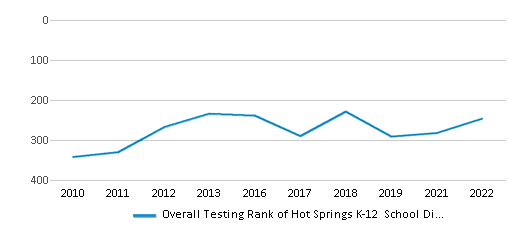
Math Test Scores (% Proficient)
30-34%
35%
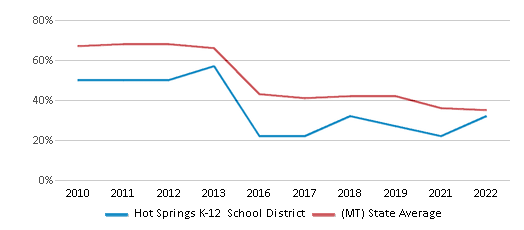
Reading/Language Arts Test Scores (% Proficient)
30-34%
46%
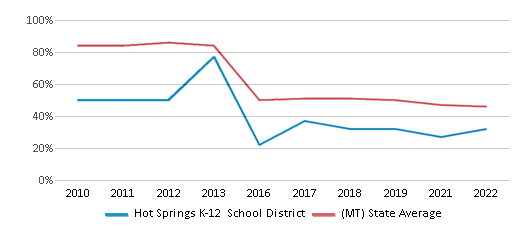
Science Test Scores (% Proficient)
30-39%
37%
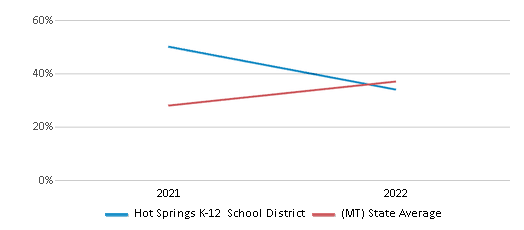
Graduation Rate
≥50%
86%
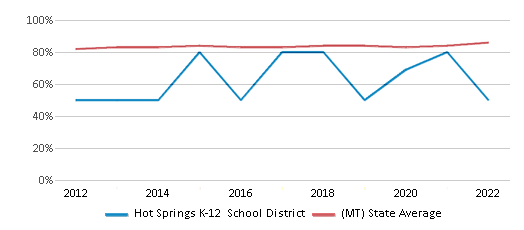
Students by Ethnicity:
Diversity Score
0.51
0.39
# American Indian Students
15 Students
3,906 Students
% American Indian Students
9%
11%
# Asian Students
n/a
202 Students
% Asian Students
n/a
1%
# Hispanic Students
5 Students
1,953 Students
% Hispanic Students
3%
6%
# Black Students
n/a
236 Students
% Black Students
n/a
1%
# White Students
106 Students
26,582 Students
% White Students
67%
77%
# Hawaiian Students
n/a
63 Students
% Hawaiian Students
n/a
n/a
# Two or more races Students
33 Students
1,583 Students
% of Two or more races Students
21%
4%
Students by Grade:
# Students in PK Grade:
1
63
# Students in K Grade:
12
440
# Students in 1st Grade:
8
446
# Students in 2nd Grade:
20
428
# Students in 3rd Grade:
11
470
# Students in 4th Grade:
19
567
# Students in 5th Grade:
10
1,752
# Students in 6th Grade:
9
7,409
# Students in 7th Grade:
11
11,480
# Students in 8th Grade:
7
11,296
# Students in 9th Grade:
12
49
# Students in 10th Grade:
12
42
# Students in 11th Grade:
15
41
# Students in 12th Grade:
12
42
# Ungraded Students:
-
-
District Revenue and Spending
The revenue/student of $20,050 is higher than the state median of $15,263. The school district revenue/student has grown by 25% over four school years.
The school district's spending/student of $19,623 is higher than the state median of $15,352. The school district spending/student has grown by 25% over four school years.
Total Revenue
$3 MM
$2,285 MM
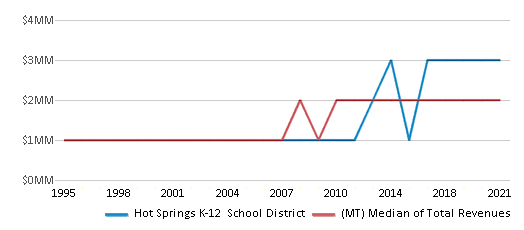
Spending
$3 MM
$2,298 MM
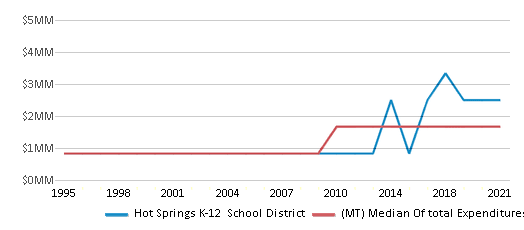
Revenue / Student
$20,050
$15,263
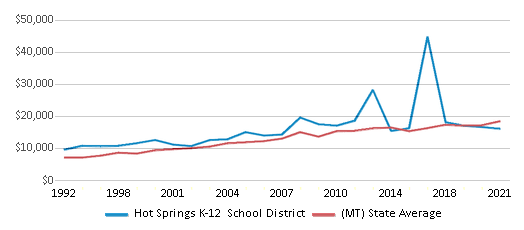
Spending / Student
$19,623
$15,352
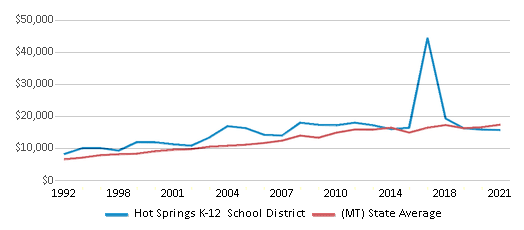
Best Hot Springs K-12 School District Public Middle Schools (2025)
School
(Math and Reading Proficiency)
(Math and Reading Proficiency)
Location
Grades
Students
Rank: #11.
Hot Springs 7-8
(Math: 21-39% | Reading: 40-59%)
Rank:
Rank:
5/
Bottom 50%10
301 Broadway
Hot Springs, MT 59845
(406) 741-2962
Hot Springs, MT 59845
(406) 741-2962
Grades: 7-8
| 18 students
Recent Articles

Year-Round Or Traditional Schedule?
Which is more appropriate for your child? A year-round attendance schedule or traditional schedule? We look at the pros and cons.

Why You Should Encourage Your Child to Join a Sports Team
Participating in team sports has a great many benefits for children, there is no doubt. In this article you will learn what those benefits are.

White Students are Now the Minority in U.S. Public Schools
Increasing birth rates among immigrant families from Asia and Central and South America, combined with lower birth rates among white families, means that for the first time in history, public school students in the United States are majority-minority. This shift in demographics poses difficulties for schools as they work to accommodate children of varying language abilities and socio-economic backgrounds.





